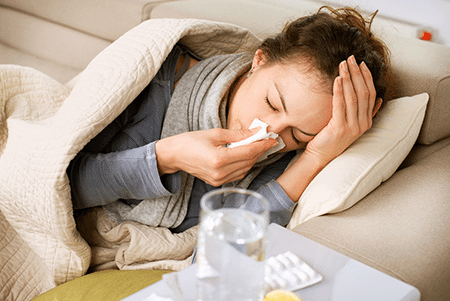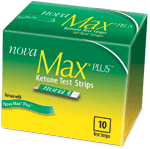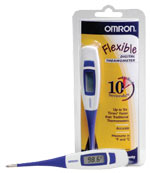For people with diabetes, a sick day goes beyond congestion and coughing. Having a flu, infection, vomiting, diarrhea or nausea can possibly increase blood sugar. It is essential to test blood sugar more frequently when you are sick and follow some basic guidelines.
- Blood sugar increases with illness, injury, and surgery as well as viral and bacterial infections. Sickness causes stress and your body releases counter-regulatory hormones to combat the illness; these hormones cause blood sugars to soar. The hormones also interfere with the ability of insulin to do its job, which can lead to life-threatening situations.
- Have extra diabetes testing supplies on hand to check blood sugar every 4 hours. Raised blood sugar may lead to several complications. People with type 1 diabetes may develop-DKA or Diabetic ketoacidosis- a condition leading to a possible coma if not treated promptly. Those with type 2 diabetes, especially the elderly who are dehydrated can face a condition called Hyperosmolar hyperglycemic non-ketotic coma.
Ketones are a type of waste which can be made by the bodies of people with diabetes when they are stressed. Use ketone testing strips and supplies to test for ketones if your blood sugar rises over 240. Drink extra water to reduce trace amounts of ketones. Contact your health care provider if ketones are found in your urine in moderate or large amounts.
- Ketones happen when the body burns fat instead of sugar for energy. Without the proper level of insulin, glucose builds in the blood and does not go into the cells. The cells then burn fat rather than glucose. Ketones are formed in the blood and go into your urine.
- Diabetic ketoacidosis (DKA) is an insulin deficiency causing metabolic changes. Hyperosmolar hyperglycemic nonketotic syndrome (HHNS) is dehydration due to hyperglycemia. Both conditions require hydration with fluids. Insulin doses may need to be adjusted with DKA and HHNS.
- Your body makes extra glucose when you are ill. Never stop taking insulin when you are sick, even if you are vomiting. Check with your health care provider about oral diabetes medicines.
-
Have diabetes home supplies available for when you get sick. Items to keep on hand include digital thermometers, caffeine free liquids with and without sugar, sugar free cough and cold medicines, broth with sodium and have an emergency contact especially if you live alone.
- Hydration is important when you are sick, especially with fever, diarrhea and vomiting. Fluids help your body fight off illness and flush out ketones your body may produce. Drink water every hour.
- There are times to call a doctor including when you have a fever of 101 or higher; diarrhea or vomiting for over 6 hours; inability to eat or drink for 4 hours; ketones in your urine-moderate to large amounts and/or blood sugar of 200 or more for more than 2 days.
- When you are sick, it is important to maintain carbohydrates. Eat or drink 45 grams of carbohydrates every four hours to prevent hypoglycemia and avoid developing ketones if your blood sugars are not too high.
Sickness is inevitable but it doesn’t have to be more difficult for people with diabetes. Planning ahead for sick days or surgery will prevent some possible complications!

 Ketones are a type of waste which can be made by the bodies of people with diabetes when they are stressed. Use
Ketones are a type of waste which can be made by the bodies of people with diabetes when they are stressed. Use  Have diabetes home supplies available for when you get sick. Items to keep on hand include
Have diabetes home supplies available for when you get sick. Items to keep on hand include 











Leave A Comment